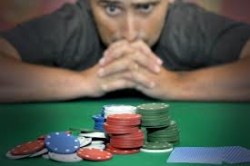Is My Loved One Addicted to Gambling?
Gambling addiction is an often hidden disease that rips families apart just as any other addiction has the potential to do. The psychological, physical, social and vocational elements of this addiction and the way that gambling addiction interrupts an individual’s life can be devastating. If you suspect that your loved one may be addicted to gambling, early recognition is the key to getting them the help that they need.
If your loved one has undergone four or more of these signs of gambling addiction over the past year there is a good chance that problem gambling is a factor:
- feeling a desire to gamble in order to increase the amount of money that they have
- feeling like they “need” to gamble in order to have fun
- acting restless or anxious when they can’t gamble
- getting upset, angry or mad if gambling is interrupted
- making promises to quit gambling and then doing it anyway
- becoming preoccupied with gambling and allowing it to take over their daily routines
- thinking about gambling all the time
- many conversations are focused on gambling, past gambling, current desires to gamble
- gambling to mask emotions of sadness or anger
- losing money on gambling and continuing to do it anyway
- lying to family members or loved ones about gambling
- lying about money spent on gambling
- covering up involvement in gambling
- downplaying the situation so it doesn’t seem so bad
- suffering from relationship problems as a result of gambling
- relying on others to provide for them because their money is spent on gambling

If your loved one has a gambling problem you should seek help now! As the problem continues, the consequences worsen!
If your loved one has shown many of these signs or if you suspect that some of these signs are a factor in your loved one’s life, gambling addiction is a likely culprit.
Additional Signs of Gambling Addiction
You may also notice other subtle signs that there’s a problem with your loved one’s finances as a result of the gambling that is taking place. Pay close attention to these additional signs of gambling addiction:
- being called by bill collectors because bills are unpaid
- asking a loved one about where they have been by they lie
- noticing that your loved one gets tied up and loses track of time while gambling
- feeling as if you cannot leave money around where the individual may get it
- being promised that the gambling will stop but it never does
- hiding money
- finding betting slips, lottery tickets or other signs of gambling in the individual’s pockets



